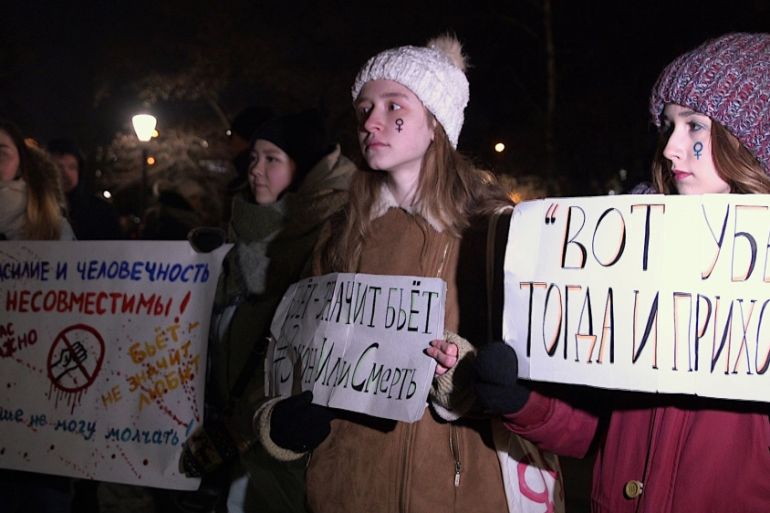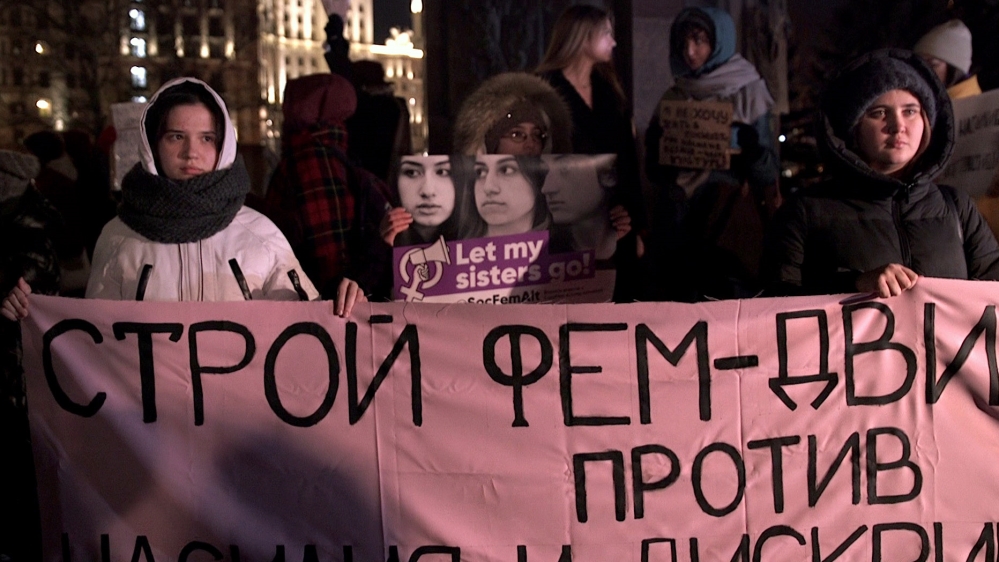Russia has no domestic violence law, but that could soon change
Following some shocking cases, new law hoped to alter dynamic in country that prioritises ‘family values’ over victims.

Moscow, Russia – For years, Mary Davtyan, a Russian lawyer who specialises in domestic violence, felt helpless when survivors approached her for support.
Russia currently has no law defining domestic violence and there is some resistance among conservative sections of society and politicians to criminalise it. They believe doing so would harm “traditional family values”.
Keep reading
list of 4 itemsChinese student jailed in US for threatening to ‘cut off hands’ of activist
What happens when activists are branded ‘terrorists’ in the Philippines?
Are settler politics running unchecked in Israel?
“I understood I couldn‘t do anything,” Davtyan told Al Jazeera. “I lacked the legal tools to successfully plead their cause.“
In 2012, one in five Russian women faced family-related violence, according to Rosstat, a national statistics body. More recently, independent polling centre Levada said the rate of domestic violence was higher, at about 25 percent.
It is believed that thousands of Russian women die every year because of domestic violence.
According to court statistics, 79 percent of women convicted for murder from 2016 to 2018 were defending themselves from abuse.
In a country that presents itself as a guardian of family values and where conservative voices are prominent, the notion of domestic abuse and violence against women is still taboo to a degree.
“The patriarchal tradition in Russia is still very deeply rooted,” said Davtyan.

Along with a group of dedicated women and men, rights activists, politicians and feminists, she is leading the charge to try to stem domestic violence, which has seen Russian parliamentarians consider a new law against the issue.
In accordance with the legislative process, Oksana Pushkina – a legislator with the ruling United Russia party and a former TV host dubbed Russia’s Oprah, launched a parliamentary working group to consult on a draft bill this summer.
Davtyan and renowned activist Alyona Popova are both members of the group.
Before getting into the complex legal issues of punishment, the group is trying to raise awareness that domestic violence constitutes a crime.
“This would be a big step, because it would acknowledge such a thing exists,” said Davtyan.
Political expert Ekaterina Schulmann, who was involved in the early stages of the legal project, said Russians tended to keep family and private matters behind closed doors.
“This problem [domestic violence] has a very high latency and is mostly hidden,” she said.
Previous attempts to criminalise domestic violence have so far failed.
In 2017, the State Duma, or assembly, approved a bill to decriminalise some forms of domestic abuse. It meant first-time offenders would be fined, instead of being charged – and legislators said the goal was to defend family values.
“It was a terrible signal of impunity for offenders and by all accounts, offences have gone up,” said Martha Khromova, a feminist activist from the SocFem Alternativa group.
She helped to organise recent demonstrations in Moscow, where hundreds have rallied in support of the draft law, which according to state-run VtsIOM pollster, 70 percent of Russians would support.
It appears attitudes are changing in Russia. Over the past two years, online campaigns and petitions calling for the criminalisation of domestic abuse have mushroomed
The Khachaturyan sisters’ case might have been a turning point.
In 2018, the three teenaged siblings killed their father after years of psychological and sexual abuse. There was an outpouring of sympathy for the sisters and people took to the streets to show their support. The sisters remain under house arrest pending trial.
“The sisters could have escaped the situation they were cornered into in they had somewhere to seek help,” said Darya Shipacheva, a domestic abuse survivor and activist. “Their case is intertwined with the problem.”

In another incident, Margarita Gracheva‘s jealous husband chopped her hands off with an axe two years ago.
After the case received significant media attention, he was sentenced to 14 years in jail, an unusually lengthy sentence.
Gracheva, with her robotic hands, is now a stark symbol of the fight against domestic violence.
“It’s not enough to have a law, we need restraining orders, we need budget to help victims, shelters for women,” said SocFem Alternativa’s Khromova.
In the most recent case to shock the country, PhD student Anastasia Yeshchenko, 24, was killed and dismembered in November by her ex-teacher and partner, 63-year-old Oleg Sokolov, 63, in Saint Petersburg.
“There is definitely a change in attitudes and in public support, which pushed us to go forward with the legal process,” said Schulmann.
Some conservative groups and sections of the powerful Russian church have pushed back against the draft bill, however, saying it is designed to “destroy the Russian family”.
Pushkina said she has received online threats and harassment for her work.
The first version of the draft bill was published on the Council of the Russian Federation website on November 29 and was open for comments and amendments for two weeks after publication; more than 10,000 were submitted for review.
Popova, the activist and parliamentary working group member, said: “It was not very good and failed to correctly define what actions are domestic violence, saying that all physical abuses are not violence. This is problematic.”
Other activists also said the text appeared to once again prioritise “family values” over victims.
An improved version for first reading at the State Duma is expected within weeks.
Then the bill will go back and forth in three readings, with possible amendments along the way, before being presented to legislators for a vote.
The activists say they know there is a long path ahead, but are reassured by recent support.
Anna Rivina, the founder of Nasiliu.net, a women’s shelter organisation which roughly receives 70 victims every month, said: “The high-profile cases are extremely symbolic and illustrate the society we have. It‘s easier now to explain what does not work, and why it doesn‘t. I’m sure the law will pass, but the question is how much time do we need for that.”